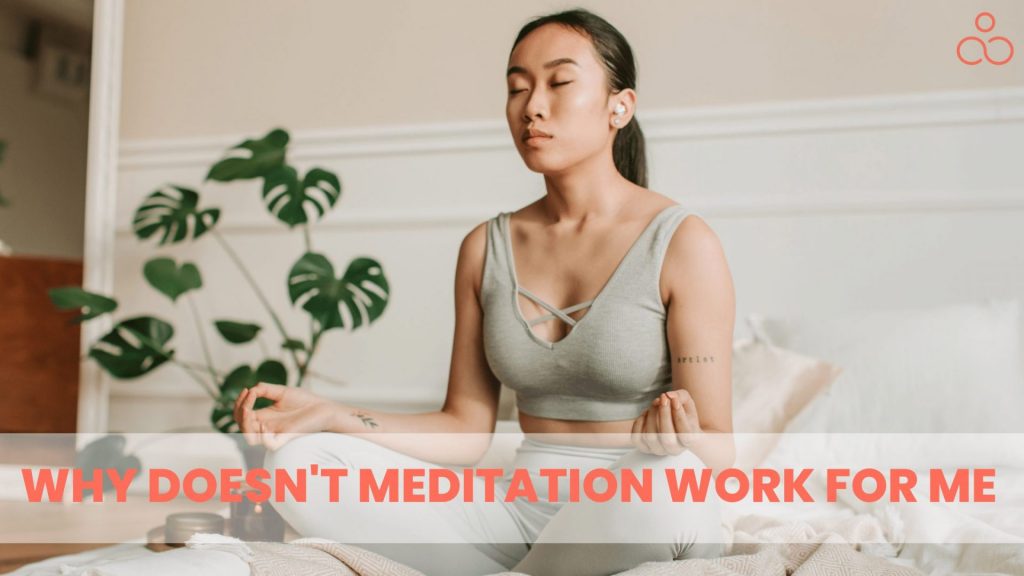The act of meditating can be very difficult. It’s simple to believe you’re not “zen” enough for meditation or individuals might question that why doesn’t meditation work for me?
Let’s first be clear: Anyone can meditate, even if you’ve tried sitting down and practising mindfulness numerous times with what seems to be no real results. Even though it’s not simple, it is doable, and some people simply take longer to understand it than others. There is really no right or wrong method to meditate; all it takes to reap its long-term rewards is persistence and patience.
Why doesn’t meditation work for me?
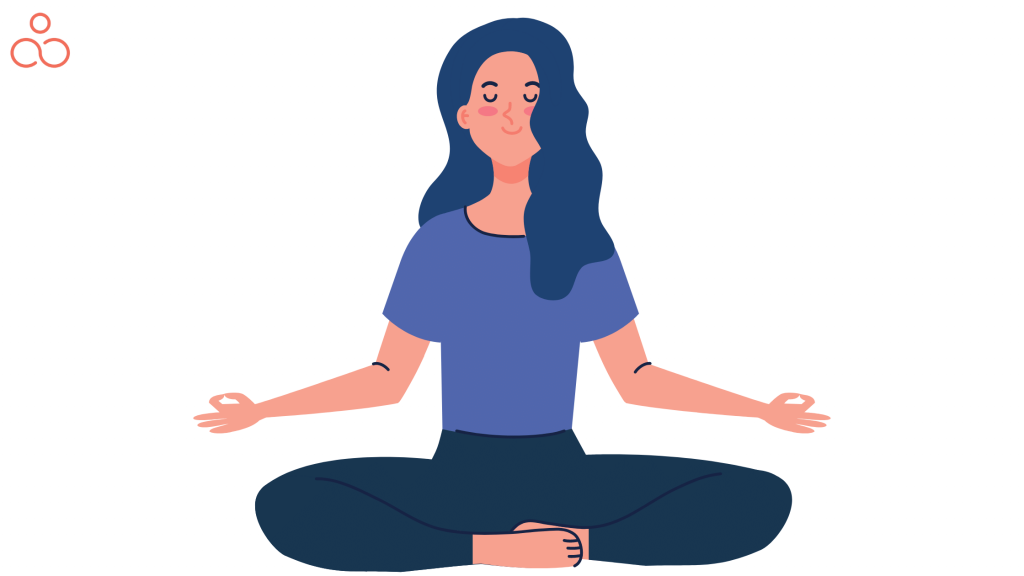
Many people often wonder why meditation doesn’t work for them. Some think that it can be due to the high pitch ringing in ears during meditation. Now, why is there ringing in the ears during meditation?
The high-pitched sound you’re hearing is not a result of meditation, but it’s all too frequent for many individuals. The term “tinnitus” refers to a medical disease that is essentially “high pitched ringing in the ears.” Only you can hear the sound; nobody else can. This ringing has a wide range of causes. and despite the fact that the internet and YouTube are filled with a variety of purported cures, medical science doesn’t actually have a cure. Some basic remedies are as such:
- Don’t sit in silence to meditate. Instead, play soothing background noise (ambient music, natural noises, white noise, etc.) and adjust the volume so that your tinnitus is only partially covered.
- This will make your tinnitus seem less loud to you, making it much simpler to concentrate during meditation.
But apart from tinnitus, it is well recognized that hearing high-pitched noises during or after your meditation practice is an indication of profound spiritual awakening. Our vibrations rise while we meditate, making us far more sensitive to higher cosmic vibrations. It has been noted that these high-frequency sounds frequently coexist with dizziness or the impression that you are looking at yourself from above. Due to the solitude and the heightened condition of our senses during meditation, it frequently happens that little sounds that are ordinarily ignored become amplified. Keep in mind that experiencing various sensations while practicing meditation is very natural and very typical. The easiest method to handle these feelings is to accept their reality and truth without giving them undue attention. In general, whether or not you hear high-pitched sounds throughout your meditation is unrelated to how well you are practicing.
There are various other types of voices or sounds that people can hear while meditating such as bells, birds chirping, the om sound, heartbeat and many more and it is said that all these different sounds and voices have different spiritual meaning.
6 Reasons why your meditation practice is not progressing
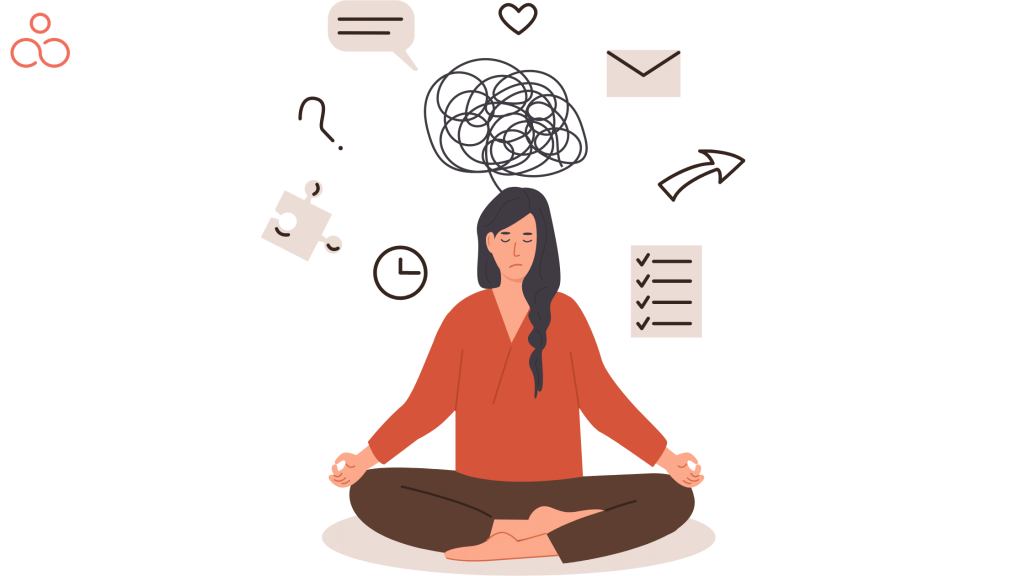
- Inconsistent or inadequate practice: Due to the stresses imposed on them, our bodies and brains are very flexible and constantly change. We put ourselves through physical hardships to strengthen our muscles and enhance our cardiovascular health. But, one workout or one run is insufficient to bring about change. The same is true of our meditation. When we desire change through meditation practice, especially in ingrained habits, we must be ready to devote a reasonable amount of time to consistent, ongoing practice. Depending on you and your goal, the length of time will vary. Keep in mind that meditation is about how we carry ourselves throughout the process, not just what happens at the conclusion.
- Expectations that are unrealistic: In Yoga or anywhere else, it’s normal to want a quick fix for your issues. There is rarely a quick fix, particularly when it comes to ongoing health issues or becoming aware of our own roles in our own lives. Progress isn’t always linear or predictable; it may feel like taking two steps ahead and one step back. Once we tackle one component of a problem, further ones might become apparent. When we had hoped for immediate relief, all of this can be frustrating. In this situation, it’s crucial to develop more reasonable expectations for how long it would take for things to change and what they might look like. Our minds are continuously changing, so it’s simple to lose track of where we were when things start to get better. A journal, for example, can track and draw attention to changes that are so minute or seem inconsequential that they would otherwise go unreported in this situation.
- Your sessions are too short: Your Yoga sessions must be lengthy enough for you to de-stress and develop focus if you want it to be effective. It won’t have much of an impact if you merely practise for ten or fifteen minutes. The impact grows stronger the longer you practise. The majority of Yoga studio lessons last an hour and a half. If you’re looking for significant advantages, think of that as the minimum. But you don’t have to rehearse for hours on end every time. You can make the most of shorter ones by using the insights and advantages you gain from longer ones.
- Your Yoga practice is far too fast-paced: For many people, Yoga can imply different things. Some people view it as a wise stretching and exercise programme. Some people even think it qualifies as a sport for competition. Such people frequently lack knowledge about the deeper benefits of Yoga. Dynamic movements are the foundation of Yoga practices with a sports focus. Dynamic Yoga is good as long as there is enough stillness to maintain balance. Your practice of Yoga will stay physical and surface-level if you don’t have immobility. The advantages you receive are comparable to those of participating in sports.
- You simply don’t enjoy it: No matter how hard you try, if you really don’t enjoy getting to your mat each day and it doesn’t feel nice, it won’t help you. Don’t feel bad about giving up Yoga; instead, look for an option that truly makes you feel good on the inside. Yoga practitioners and teachers will claim that Yoga is suitable for everybody, but some people may require more time to come around or may just need to practise Yoga again at a different point in their lives in order to truly connect with it. And that’s completely fine.
- An ineffective strategy: Everyone is unique. It’s not necessarily true that everyone will respond well to a strategy that works for one individual or even the majority of individuals. Hence, regardless of how well-liked your practice is, how strongly it is backed by evidence, or how devoted and careful you have been in its implementation, it could still not produce the desired outcome. As a result, if you have been carefully practising for some time with an eye towards the effects of off-mat activities but have not yet experienced any substantial benefits, it’s probably time to switch strategies. Apart from these reasons, there is also a very common complaint people have when they are meditating. It is about the high pitched sounds that they can hear while meditating and are not able to put their full concentration during the entire practice. Let us try to know a little bit more about these higher pitched sounds and whether these sounds have different meanings as well.
Some Strange Sounds You Might Hear and Their Meaning
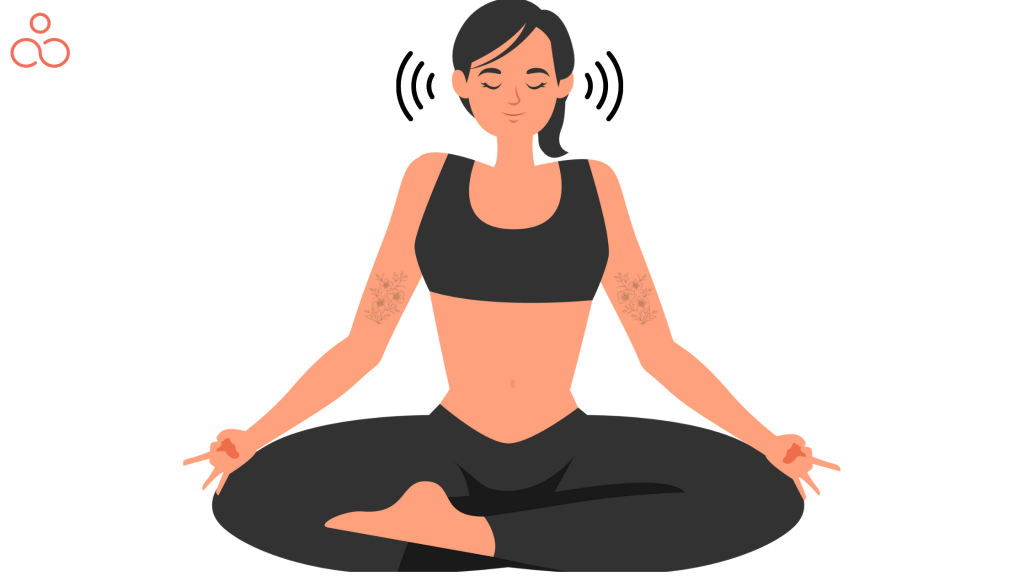
- Bells Ringing During Meditation: A bell is associated with spiritual meaning and significance in every nation and culture on earth. It is thought to represent the origins and endings of our life. In this situation, hearing bells during meditation could signify the close or start of a new chapter in your life. They can simply serve as a reminder that progress is always positive.
- Can hear your heartbeat: Even the smallest sensations can appear to be suddenly very vivid and noticeable when our body is elevated due to meditation. Our heartbeat is one of these constant sensations that typically goes unnoticed. Intense heartbeats during meditation are frequently reported by meditators as being a source of distraction. It’s crucial to understand how our senses alter during meditation to ensure that you may just acknowledge the sound of your heartbeat and ignore it rather than focusing on it.
- Hearing birds chirp while meditating: Often, when you hear sounds during meditation, it’s just your senses being more acute. When we practice, we pay attention to sounds and feelings that we ordinarily would have overlooked. One of these sounds might be the birds outside your window, which our minds frequently classify as background noise. Birds are symbolic of higher elevations, spiritual awakening, hope, and wisdom in a spiritual context. During your meditation, you might hear bird chirping noises as signals from your higher self.
- Messages Heard During Meditation: Acquiring the skill to stop your mind’s chatter and related internal dialogue is a key component of becoming a skilled meditation practitioner. Our internal monologue frequently communicates subconscious notions that we might not be aware of in daily life; during meditation, our senses are at their most acute, amplifying these thoughts. It’s probable that when you receive specific messages during meditation, your higher self is speaking to you and facilitating a spiritual connection.
3 Tips to practise effective meditation
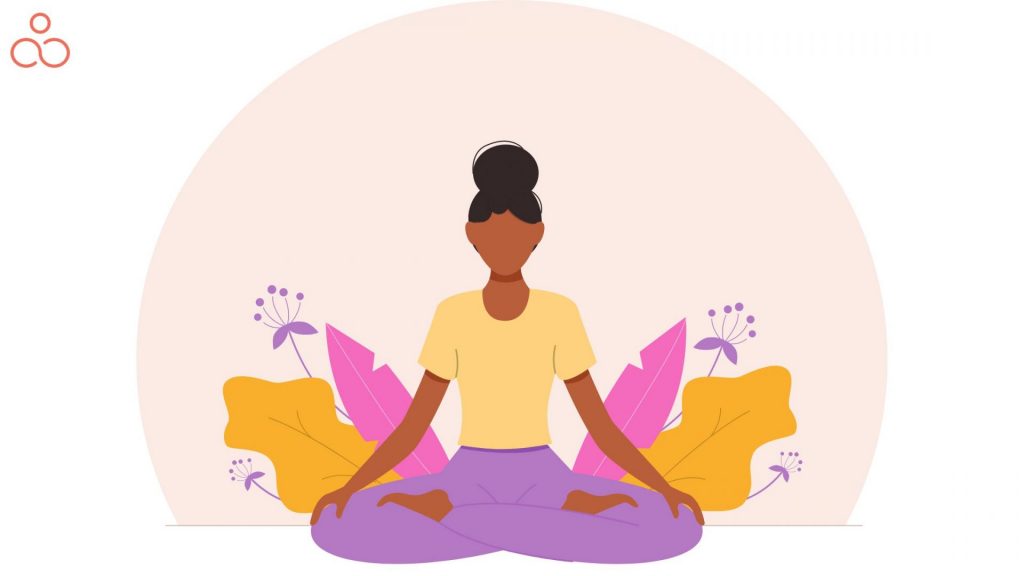
Here are some of the tips which may help you to practice meditation more effectively and you might get better and faster results.
- Don’t expect anything: Many newcomers to meditation feel like their efforts have been in vain because they enter the practice with preconceived notions of how it “should” proceed. It’s not about trying to control your own ideas when you meditate; rather, it’s about learning to accept uncomfortable feelings and thoughts without getting upset by them. Practice is key, not precision. Let go of your expectations and observe the results, my buddy.
- Think About Making Your Practice Brief And Sweet: Hello you Stop persuading yourself that in order to experience the benefits of meditation, you “need” to practise it for 30 minutes each day. It will be much simpler to approach mindfulness boldly and free of that terrifying sense of failure once you release yourself of all the random constraints you’ve imposed on it. Sincerely, just a few minutes of meditation can completely change your outlook and make your day. And if you don’t force yourself to sit for as long as you’d like, you may realize that you genuinely want to know what longer sessions of meditation are like.
- A Powerful Tool You Should Never Forget Is Your Breath: There is no right or wrong method to breathe, just as there is no right or wrong way to meditate. Using your breath as a technique to ease into each one of your meditation practices will help you feel as calm and in-tune as possible. This is the main thing to remember. You’re allowed to breathe however you want after that, though. Finding your unique relaxation mechanism is key.
- Explore Group Settings: It’s conceivable that the reason meditation doesn’t work for you is that you find it difficult to stick to the practice on your own. A group meditation practice certainly won’t harm, and it might even help keep you responsible as you figure out what’s best for you even though meditation is usually a solo activity. A meditation club might even encourage you to practise meditation in your spare time at home. Who knows? Before you realise it, meditation will be completely natural to you.
- Try Out Walking Meditations: The difficulty of remaining still is another obstacle that new meditators may find discouraging. It can be very difficult to remain still for even a short period of time because you might feel the need to change your clothes or touch an itch. The practice of walking meditations may be a lovely method to get started and improve your awareness of your surroundings. You can feel at ease and confident just by listening to the rhythmic sound of your steps as you move through your day.
- Rather than trying to silence your anxious thoughts, embrace them: You might think that your meditation routine is a failure because you are unable to focus your thoughts. But this is a very widespread misconception about meditation: It’s not about stifling or suppressing your ideas! Trying to observe your feelings objectively during meditation involves simply recognizing what is going on in your head before allowing it to go. You’ll realise you’ve been a pro at meditation once you give up attempting to manage every aspect of your meditative practise.
FAQs
Is Yoga effective for everyone?
No matter your age, gender, ethnicity, physical characteristics, backgrounds, or level of fitness, Yoga is a practice that may be beneficial, strengthening, peaceful, and uplifting. Yoga involves holding various postures with the help of your body. By consciously working your muscles to maintain a pose and using your core as support, Yoga can really help you build strength.
Why don’t some individuals practice Yoga?
One of the most frequent excuses given for people’s reluctance to practice Yoga is pain. According to my observations, doing Yoga when suffering from an injury is humble but always effective at reducing pain. The majority of people’s discomfort is caused by their inactivity, and if they do nothing, their agony will only get worse.
How can I encourage myself to practice Yoga?
Some basic tips are:
- Start with a small Yoga session and just spread your mat out .
- Breathe normally.
- Do what makes you feel wonderful.
- Take note of how both you and your body feel before and after a Yoga session; the impact can be profound.
Does regular Yoga and meditation have an impact?
Strengthening your routine will help you gain muscle and significantly raise your metabolism. Additionally, deep breathing improves circulation, which helps keep your metabolism running smoothly. Some pranayama (yogic-experience), some upper body strength, and obviously, some opening work is also necessary.
Can Yoga and meditation affect what you think?
All forms of exercise can improve your mood by reducing stress hormone levels, boosting the creation of endorphins, and increasing the amount of oxygenated blood flowing to your brain. But there might be other advantages to Yoga. Gamma-aminobutyric acid (GABA), which is linked to a higher mood and less anxiety, is a brain molecule that can influence mood by increasing levels. The limbic system, the area of the brain responsible for emotions, experiences less activity as a result of meditation.
Will practicing Yoga and meditation improve my character?
Yes, it might help you to alleviate your personality as practicing Yoga makes you feel more fresh and calm and at the same time you are filled with positivity. This may initially help you feel more confident and you may start making better decisions for yourself.
Is Yoga a requirement for life?
For people of all ages, Yoga has positive effects on both physical and mental health. Yoga can also be an important element of your treatment if you’re recuperating from surgery, dealing with an illness, or have a chronic disease. This could potentially speed up your recovery.
Does Yoga and meditation help with bad thoughts?
Yoga is thought to calm the mind and slow heart rate, which lowers anxiety, which is a symptom of depression. It is based on the idea of assisting one in living in the present, reducing negative thinking, and concentrating on all the positive things that life brings our way.
Conclusion
In conclusion we can say that Yoga can be beneficial in many ways if done in a proper manner. Yoga can help people feel less stressed, anxious, and depressed. It is therefore a supplemental form of medicine. To enhance your personality, you must maintain excellent health, adequate mental development, and emotional control. This and more are all benefits of Yoga. It reduces your physical suffering, emotional tension, and bad thoughts while keeping you calm and balanced.
So, let’s start doing the basic Yoga practice for minimum time but in an effective manner and start our day with positivity and confidence.

